| Listing 1 - 7 of 7 |
Sort by
|
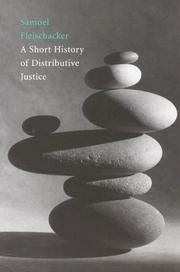
ISBN: 0674018311 0674013409 9780674018310 0674036980 0674263464 Year: 2004 Publisher: Cambridge: Harvard university press,
Abstract | Keywords | Export | Availability | Bookmark
 Loading...
Loading...Choose an application
- Reference Manager
- EndNote
- RefWorks (Direct export to RefWorks)
The surprising finding of this book is that, contrary to conventional wisdom, global income inequality is decreasing. Critics of globalization and others maintain that the spread of consumer capitalism is dramatically polarizing the worldwide distribution of income. But as the demographer Glenn Firebaugh carefully shows, income inequality for the world peaked in the late twentieth century and is now heading downward because of declining income inequality across nations. Furthermore, as income inequality declines across nations, it is rising within nations (though not as rapidly as it is declining across nations). Firebaugh claims that this historic transition represents a new geography of global income inequality in the twenty-first century. This book documents the new geography, describes its causes, and explains why other analysts have missed one of the defining features of our era--a transition in inequality that is reducing the importance of where a person is born in determining his or her future well-being.
Political philosophy. Social philosophy --- Legal theory and methods. Philosophy of law --- Distributieve rechtvaardigheid --- Distributive justice --- Justice [Distributive ] --- Justice distributive --- Rechtvaardigheid [Distributieve ] --- Rechtvaardigheid [Verdelende ] --- Verdelende rechtvaardigheid --- Distributive justice. --- Distribution (Economic theory) --- Justice --- Social justice --- Wealth --- Moral and ethical aspects
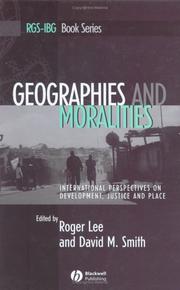
ISBN: 1405116366 1405116374 Year: 2004 Publisher: Malden (Mass.) : Blackwell science,
Abstract | Keywords | Export | Availability | Bookmark
 Loading...
Loading...Choose an application
- Reference Manager
- EndNote
- RefWorks (Direct export to RefWorks)
Distributive justice. --- Geografie --- Geography --- Regional disparities. --- Sociale en economische geografie --- Verzamel- en mengelwerken. --- Moral and ethical aspects.
Book
ISBN: 2227472847 9782227472846 Year: 2004 Publisher: Paris: Bayard,
Abstract | Keywords | Export | Availability | Bookmark
 Loading...
Loading...Choose an application
- Reference Manager
- EndNote
- RefWorks (Direct export to RefWorks)
Book
ISBN: 0857456741 Year: 2004 Publisher: New York, NY : Berghahn Books,
Abstract | Keywords | Export | Availability | Bookmark
 Loading...
Loading...Choose an application
- Reference Manager
- EndNote
- RefWorks (Direct export to RefWorks)
Anthropologists know that conservation often disempowers already under-privileged groups, and that it also fails to protect environments. Through a series of ethnographic studies, this book argues that the real problem is not the disappearance of ""pristine nature"" or even the land-use practices of uneducated people. Rather, what we know about culturally determined patterns of consumption, production and unequal distribution, suggests that critical attention would be better turned on discourses of ""primitiveness"" and ""pristine nature"" so prevalent within conservation ideology, and on t
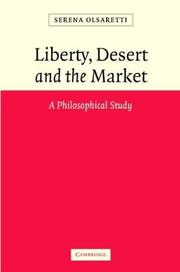
ISBN: 0521836352 9780521836357 9780521107815 9780511487422 0511230613 9780511230615 0511228996 9780511228995 0511229836 9780511229831 9780511231384 0511231385 9780511316630 0511316631 0511487428 128070313X 9781280703133 0521107814 1107161444 Year: 2004 Publisher: Cambridge : Cambridge University Press,
Abstract | Keywords | Export | Availability | Bookmark
 Loading...
Loading...Choose an application
- Reference Manager
- EndNote
- RefWorks (Direct export to RefWorks)
Are inequalities of income created by the free market just? In this book Serena Olsaretti examines two main arguments that justify those inequalities: the first claims that they are just because they are deserved, and the second claims that they are just because they are what free individuals are entitled to. Both these arguments purport to show, in different ways, that giving responsible individuals their due requires that free market inequalities in incomes be allowed. Olsaretti argues, however, that neither argument is successful, and shows that when we examine closely the principle of desert and the notions of liberty and choice invoked by defenders of the free market, it appears that a conception of justice that would accommodate these notions, far from supporting free market inequalities, calls for their elimination. Her book will be of interest to a wide range of readers in political philosophy, political theory and normative economics.
#SBIB:316.8H00 --- #SBIB:17H20 --- #SBIB:17H25 --- Sociaal beleid: algemeen --- Sociale wijsbegeerte: algemeen --- Sociale wijsbegeerte: economische orde en arbeid --- Distributive justice. --- Free enterprise --- Income distribution. --- Social aspects. --- Moral and ethical aspects. --- Distributive justice --- Income distribution --- Distribution of income --- Income inequality --- Inequality of income --- Distribution (Economic theory) --- Disposable income --- Justice --- Social justice --- Wealth --- Moral and ethical aspects --- Social aspects --- Arts and Humanities --- Philosophy
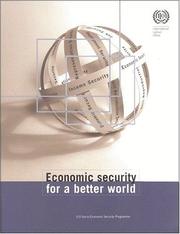
ISBN: 9221156117 Year: 2004 Publisher: Geneva : International labour office,
Abstract | Keywords | Export | Availability | Bookmark
 Loading...
Loading...Choose an application
- Reference Manager
- EndNote
- RefWorks (Direct export to RefWorks)
Economic security --- Social security --- Public welfare --- Sécurité économique --- Sécurité sociale --- Aide sociale --- Sociaal beleid 304:32 --- Maatschappelijke werk 36 --- Sociale zekerheid 368.4 --- Internationale arbeidsorganisatie / IAO 331.91 --- Distributive justice. --- Economic security. --- Foreign trade and employment. --- Labor policy. --- Social rights. --- Desenvolvimento econômico. --- Direitos humanos. --- Justiça social. --- Política trabalhista. --- Desenvolvimento econômico. --- Sécurité économique --- Sécurité sociale --- Distributive justice --- Foreign trade and employment --- Labor policy --- Social rights --- Human rights --- Basic needs --- Labor --- State and labor --- Economic policy --- Employment and foreign trade --- Labor market --- Commerce --- International trade --- Labor supply --- Investments, Foreign, and employment --- Trade adjustment assistance --- Security, Economic --- Social policy --- Welfare economics --- Distribution (Economic theory) --- Justice --- Social justice --- Wealth --- Government policy --- Effect of international trade on --- Moral and ethical aspects --- Socio-economic rights --- Socioeconomic rights --- Law and legislation
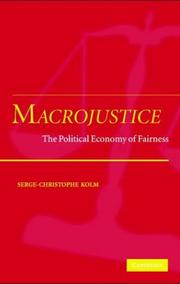
ISBN: 0521835038 0511082150 110713952X 0521176549 0511121717 0511298307 0511510934 1280163461 0511196830 0511081707 9780511082153 9780511121715 9780511510939 9780511081705 9781280163463 9780521835039 9780521176545 Year: 2004 Publisher: New York: Cambridge university press,
Abstract | Keywords | Export | Availability | Bookmark
 Loading...
Loading...Choose an application
- Reference Manager
- EndNote
- RefWorks (Direct export to RefWorks)
The main features of the just society, as they would be chosen by the unanimous, impartial, and fully informed judgment of its members, present a remarkable and simple meaningful structure. In this society, individuals' freedom is fully respected, and overall redistribution amounts to an equal sharing of individuals' different earnings obtained by the same limited 'equalization labour'. The concept of equalization labour is a measure of the degree of community, solidarity, reciprocity, redistribution, and equalization of the society under consideration. It is determined by a number of methods presented in this 2005 study, which also emphasizes the rationality, meanings, properties, and ways of practical implementation of this optimum distribution. This result is compared with the various distributive principles found in practice and in political, philosophical, and economic thinking, with the conclusion that most have their proper specific scope of application. The analytical presentation of the social ethics of economics is particularly enlightening.
Economics --- Distributive justice --- Income distribution --- Wealth --- Poverty --- Moral and ethical aspects --- 174.5 --- 330.56 --- Affluence --- Distribution of wealth --- Fortunes --- Riches --- Business --- Finance --- Capital --- Money --- Property --- Well-being --- Destitution --- Basic needs --- Begging --- Poor --- Subsistence economy --- Distribution of income --- Income inequality --- Inequality of income --- Distribution (Economic theory) --- Disposable income --- Economic theory --- Political economy --- Social sciences --- Economic man --- Justice --- Social justice --- 330.56 Nationaal inkomen. Volksinkomen. Gezinsinkomen. Vermogensstratificatie. Particuliere inkomens en bestedingen. Armoede. Honger --- Nationaal inkomen. Volksinkomen. Gezinsinkomen. Vermogensstratificatie. Particuliere inkomens en bestedingen. Armoede. Honger --- 174.5 Economische ethiek. Speculatie --- Economische ethiek. Speculatie --- Distributive justice. --- Income distribution. --- Poverty. --- Wealth. --- Moral and ethical aspects. --- Business, Economy and Management --- Economics - Moral and ethical aspects --- ECONOMIE --- JUSTICE DISTRIBUTIVE --- DISTRIBUTION DES REVENUS --- PHILOSOPHIE POLITIQUE --- POLITIQUE FISCALE --- RICHESSE --- PAUVRETE --- ASPECTS MORAL ET ETHIQUE
| Listing 1 - 7 of 7 |
Sort by
|

 Search
Search Feedback
Feedback About UniCat
About UniCat  Help
Help News
News